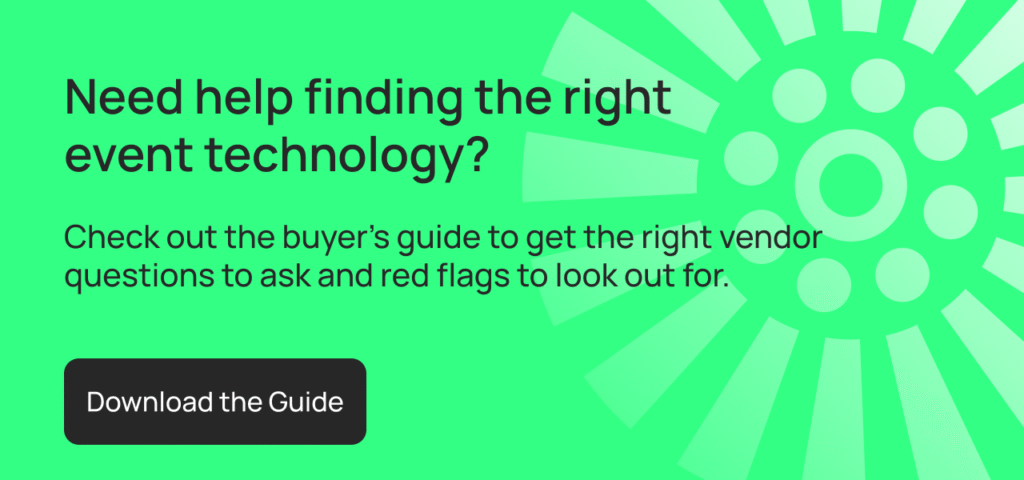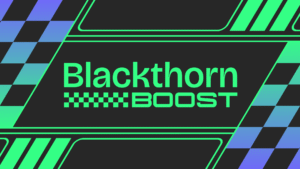
Your Complete Guide to Event Planning, Operations, and ROI in Salesforce
Event planning takes time, budget, and staff power, but what really matters is whether those events move the needle. Did attendance lead to new applications, donations, or deals? Did the experience deepen relationships or just check a box?
For too many planners, the answer is unclear. That’s because event data lives in spreadsheets, siloed tools, or “bolt-on” integrations that don’t connect back to the bigger picture. Without the best CRM for event planners, you can see who showed up, but not what it meant for your institution or business.
That’s where Salesforce stands apart. As the world’s leading CRM, it’s already the system of record for students, donors, members, and customers. When you pair it with Salesforce-native event management software, every registration, check-in, payment, and follow-up flows into the same system. No guessing, no exporting — just one source of truth that ties events directly to outcomes.
In this guide, you’ll learn how to:
- Understand why Salesforce is the strongest CRM foundation for event planners and how it connects event engagement directly to outcomes like applications, donations, and deals.
- Streamline registration and check-in with Salesforce-native tools that save staff time and deliver a seamless attendee experience.
- Use Salesforce-native tools to create a cohesive brand experience across every touchpoint, from invitations and landing pages to onsite check-in and post-event follow-up.
- Prove event ROI with dashboards leadership actually uses, turning attendance and engagement data into clear, actionable insights.
Why Is Salesforce the Best CRM for Event Planners?

Salesforce is the world’s leading CRM, and for event planners, it’s the strongest foundation you can build on. Here’s why:
It’s already your system of record
Universities, nonprofits, healthcare orgs, and businesses use Salesforce to track students, donors, patients, members, or customers. Keeping event data in that same system ensures nothing falls through the cracks.
It connects events to outcomes
With Salesforce, event engagement can be tied directly to applications, donations, opportunities, or membership renewals. That means no more guessing about ROI — it’s visible in the same dashboards leadership already uses.
It scales with you
Whether you’re hosting 50-person workshops or global conferences, Salesforce is built for enterprise-scale data, security, and reporting.
It’s flexible and customizable
Salesforce supports custom objects, workflows, and automation. That means you can tailor event processes to your organization without forcing staff into rigid systems.
The takeaway: if you’re an event planner, your CRM should be Salesforce. The next step is choosing event management software that extends Salesforce natively, so every event touchpoint is tracked in one place.
Pre-Event Planning and Strategy in Salesforce
Map the Attendee Journey
Your attendee journey begins long before anyone walks into the venue. Pre-event invitations, marketing sources, and registrations set the stage for everything that follows. By mapping these touchpoints in Salesforce, you create the foundation for personalized outreach and ROI tracking.
When event data lives natively in Salesforce, it’s easier to spot drop-offs, compare outcomes across series, and connect experiences to applications, donations, or deals. Pre-event strategy is where the entire lifecycle gets set up for success.
Further Reading:
Why Mapping the Attendee Journey Matters for Better Events
Set SMART Goals You Can Actually Measure
Specific, Measurable, Attainable, Relevant, and Time-bound goals define success before the event even begins. Tie each goal to a Salesforce field or dashboard you’ll use later: registrations from new contacts, session engagement, applications, gifts, demos, or influenced revenue. Decide how you’ll measure outcomes now, so you’re not scrambling afterward.
Further Reading:
Stop Guessing: Set SMART Event Goals to Prove Impact
Ditch Spreadsheets: Master Event Registration in Salesforce
Spreadsheets can’t keep up with modern event planning. With Salesforce-native event management software, you can build targeted invite lists, publish branded landing pages, manage waitlists, accept payments, and trigger confirmations automatically. Because the data lives directly in Salesforce, reporting is real-time and reliable — no messy exports required.
Further Reading:
Ditch Spreadsheets: Master Event Registration in Salesforce
The Best Stripe and Salesforce Integration for Payments
Make Your Brand Unmistakable Across Forms, Email, and App
Brand consistency builds trust. Salesforce-native tools can extend your identity across registration forms, email templates, mobile event hubs, session materials, and on-site signage. Equip staff with a friendly, on‑brand check‑in script and visual cues that make arrivals feel intentional.
Further Reading:
10 Event Branding Tips to Build Lasting Connections
Onsite Operations with Salesforce
Scan‑Based Check‑In That Sets the Tone
First impressions matter. With QR or barcode scanning tied directly to Salesforce, check-in lines move quickly, VIPs get flagged, and attendance data is instantly reportable for session tracking and follow-ups.
Further Reading:
Stress‑Free Event Check‑In in Salesforce: Mobile Scanning
Offline Mode When Wi-Fi Fails
Offline mode isn’t just a feature — it’s a safety net that keeps check-in running smoothly, even when Wi-Fi fails.
Even great venues have dead zones. Choose a platform with true offline mode where core workflows continue, actions store locally, and sync back safely without duplicates once connectivity returns. Staff know exactly what’s synced vs pending, so nothing gets lost.
Further Reading:
5 Reliable Event Technology Must‑Haves for Success
Post‑Event Necessities for Measuring ROI
Clean Data and One Source of Truth
ROI reporting is only as good as the data underneath it. Salesforce-native event management keeps every registration, check-in, payment, and engagement touchpoint in Salesforce itself. That means no risky imports, fewer duplicates, and dashboards that reflect reality.
As Meghan Toth, Director of Prospect Research at Barnard College, said in a recent webinar Why Event Planners Should Care about CRM Strategy:
“Being able to use Salesforce and these reports helped us to track the same data and track the same engagement points over our prospects, over our donors lifecycles. It’s helping us use this information to prioritize not only the research but the follow-up and basically every aspect thereafter. “
Dashboards Leadership Actually Uses
Executives don’t want dozens of spreadsheets — they want clear, actionable dashboards. In Salesforce, you can measure awareness, engagement, pipeline, gifts, or applications. Standard views should include registrations vs. targets, attendance by segment, session popularity, payments or revenue, and follow-up actions.
Further Reading:
Ditch Spreadsheets: Master Event Registration in Salesforce
Why Mapping the Attendee Journey Matters for Better Events
Event Management Software Comparisons
When you first start exploring tools, the promises can all sound the same: smooth check-in, better branding, higher ROI. The real difference is how well a platform works with Salesforce — and how reliably it performs when your event is under pressure.
As you evaluate, focus on the essentials:
- Can it handle peak check-in moments?
- Will it scale with your team as events grow?
- Does it meet compliance needs (PCI DSS, SOC 2, FERPA, HIPAA)?
- How does it perform when Wi-Fi fails?
- How quickly can you start using real data?
Salesforce-Native vs. “Integrated”: Why It Matters
Many tools claim to “integrate” with Salesforce, but that often means delayed syncs, duplicates, and manual exports. Salesforce-native platforms store event data directly in Salesforce objects alongside leads, contacts, and accounts. That means registrations, check-ins, payments, and follow-ups are instantly reportable without fragile connectors in the middle.
Choose the Right Event Management Platform for Salesforce
The best CRM for event planners is Salesforce, but the real difference comes from the event management software you choose to pair with it. Don’t risk wasted budget or messy integrations.
Download the Salesforce Event Tech Guide to:
- Ask the right questions when evaluating vendors.
- Spot red flags before they become problems.
- Use our evaluation template to compare solutions side by side.
Make your next event tech investment with confidence.
FAQs
Q: What is the best CRM for event planners?
A: The best CRM for event planners is Salesforce. It’s already the system of record for students, donors, members, and customers, making it the strongest foundation for event success. The key is pairing Salesforce with Salesforce-native event management software, so registration, check-in, engagement, and follow-up are captured directly in Salesforce without spreadsheets or fragile integrations.
Q: Why does Salesforce-native event management matter?
A: Native solutions keep event data in Salesforce itself, so it’s always up to date. That means less exporting, fewer sync issues, and faster reporting. For many teams, this translates to cleaner data and less manual work.
Q: How do I measure event ROI in Salesforce?
A: Start simple: track how many people registered, how many attended, and what they did afterward. Did they donate, apply, book a demo, or renew membership? With Salesforce, these actions can be tied directly to campaigns, revenue, or pipeline influence, giving you a clear picture of ROI.
Q: What should I look for in event management software reviews?
A: Pay attention to what other planners say about ease of use, support, and reliability. Reviews often reveal whether the software really saves time and reduces stress—or if it creates more work behind the scenes.
Q: How do I know if an event platform is reliable?
A: Ask yourself: has the vendor supported events like mine before? Check reviews for mentions of uptime, customer support, and smooth check-in experiences. Reliable tools are the ones that planners trust to keep lines moving and data accurate even when Wi-Fi isn’t perfect.
See how 350+ Salesforce teams run events
Feeling boxed in by your current event tools? Not quite ready for a one-on-one?
Watch our Essentials demo to see how teams are ditching disconnected tools and running every part of their events directly in Salesforce.



